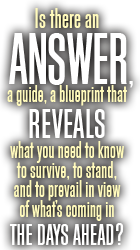
I hear from thousands of Christians each week, and sometimes that many in a day. I also hear from those from other faiths or no faith at all. They are diverse—from almost every denomination and nation. I don't base the following on scientific polling, but it is a good sampling and may be even more accurate than the polls have been recently.
Most seem to think that Trump is either a messenger from the Messiah or from the antichrist, and few are in between. Some Christians are shocked that other Christians would vote for Trump, yet polls indicate that more than half of evangelical Christians are voting for him. Why?
This is a valid question that reveals a lot about the state of the nation and also the church. The following seem to be the main reasons Christians have given for supporting Donald Trump rather than the other more vocal or devoted believers.
- FACTOR #1: Many no longer trust politicians who claim to be Christians or conservatives. These seem to inevitably change when they get to Washington and fail to keep their promises.
- FACTOR #2: There has been such a vacuum of courage in leadership that it is now esteemed above other virtues.
- FACTOR #3: Fewer Christians are choosing a candidate based on the candidate's faith. Rather, they decide based on who they think will do the best job confronting the important issues of the time.
- FACTOR #4: The two main issues in this election are security and the economy. Trump is seen as the strongest in both issues.
- FACTOR #5: Trump's lack of political correctness (PC) and willingness to say what he thinks have many believing he will resist political pressure and do what is right for the country, instead of for special interests.
- FACTOR #6: Christians are increasingly disgusted with the Republican establishment, and Trump is seen as the "wrecking ball" needed to pry the government out of the hands of the political elite.
- FACTOR #7: They think that they have heard from God about Trump.
- FACTOR #8: The extreme opposition to Trump from all of the bad guys proves he's God's choice.
There may be other factors, but these seem to be the primary ones. When we dig down on these, it is an even more stunning revelation of where the country is and potential changes in direction if these continue to grow.
The following are some of the main factors why Christians do not support Donald Trump's nomination:
- FACTOR #1: He is obviously not the kind of devout Christian they want to see as a leader, especially after Obama's relentless assault on Christianity.
- FACTOR #2: His behavior, demeanor and language.
- FACTOR #3: His seemingly immature overreaction to criticism and his tendency to try to bully opposition.
- FACTOR #4: His ambiguous and tepid support for pro-life issues.
- FACTOR #5: His lack of understanding of and support for Israel.
- FACTOR #6: His ambiguous devotion to restoring the authority of the Constitution.
- FACTOR #7: His seeming lack of understanding that a true conservative justice devoted to the Constitution, like Scalia, needs to be appointed to the Supreme Court—not someone like his liberal sister that he once implied he would appoint.
- FACTOR #8: Questionable business practices, including several bankruptcies.
Like the reasons why so many Christians support Trump, there are legitimate reasons why others do not support him. What is not legitimate is for any Christian to question the faith of those who do not see this the same way that they do. Those who do this are still immature. This is why the apostle Paul called the Corinthians "still carnal" (1 Cor. 3)—they were dividing over people for which they had a preference. We should obey the command to "mark those who cause divisions" (see Jude 1)—those who try to create riffs in the body over things like that—and not follow them.
Trends
Although I can appreciate why any Christian would have trouble supporting Trump, it is encouraging that so many sincere and mature Christians would support him in spite of the negatives. How many of us would have chosen the ones Jesus picked to be His leaders? Why didn't He go to the religious conservatives to find the future leaders of His church? Like it or not, the ones He chose were more like Trump than those we tend to esteem. Even the apostle John, who is now known as the great messenger of love, was so reactionary that he wanted to call down fire from heaven to consume those who disagreed with them. On the night before Jesus was crucified, the disciples argued over who was the greatest. Sounds like Trump to me.
How many of us would continue to support a leader who, after many years of serving and walking with God as a righteous and just leader, had an affair, and even worse, had the husband killed to cover it up? Yet it is said that Israel went astray by following Absalom, who sought to displace David because of his sin.
In contrast, God commended Zadok the priest and gave an eternal blessing over his family for being faithful to David in this situation. The Lord knew when He called David that he would fall like this, but He called him anyway. And how could God love Jacob like He did? Jacob's name means "usurper" and he was a devious liar and cheat, but "God loved Jacob."
This should not excuse character flaws in leaders, but there will only be One perfect leader. Character is important, but an unrealistic perfectionism can make us incapable of ever choosing a Washington, a Benjamin Franklin, a Lincoln or a Churchill. Some character traits crucial for church leadership could be a hindrance for civil government leaders. The last person you want in a civil leadership position is one who "turns the other cheek." As we see in Romans 13, those in civil authority are given the sword "to avenge evil"—they would be disobedient to not use their weapons for this purpose.
The Pharisees were resolutely devoted to character, and Paul, the "Pharisee of Pharisees," called himself "blameless." However, he was the worst enemy of the church and truth until the Lord struck him blind. The Pharisees were the most devout religious conservatives of the time, yet they were the worst enemies of the Messiah. Consider how they criticized everything He said and did and ultimately were responsible for having Him crucified. Think about how much grace and mercy the Lord had for sinners and how little tolerance He had for the self-righteous.
That being said, even some of the great prophets in Scripture, like Samuel, had a hard time judging people after their heart rather than their appearance. It is hard even for prophets to see people as they are called to be rather than as they are, but that is what we must seek to do. Many Christians voted for Jimmy Carter because of his boldness about his faith, but how did that work out? I'm not saying that Trump is another Reagan, but almost all of the things now said about Trump were said about Reagan. Like Trump, Reagan seemed to be a nominal Christian when elected, but it turned out pretty good.
Even so, I admit that Trump is still a challenge. I can see sound biblical reasons for supporting him and for not supporting him. I think this is a good thing. It forces many to examine their convictions about many important things, which can only strengthen us if we refuse to let it divide us.
A New Party?
Presently it seems that Republican outrage at their own party establishment is greater than their outrage at Obama and the Democrats. The more the establishment attacks Trump, the more it is viewed as an attack on those who support him—which has now surpassed more than 50 percent of Republicans in the most recent polls. There is such division between the Republican establishment and the grassroots that its future as a viable force in American politics is increasingly cloudy. Many see this as the establishment being more concerned about holding on to their own power than doing what is best for the party or the country.
The establishment still does not understand that people are angry because they have good reasons to be. People feel betrayed because they have been betrayed. They elected politicians who promised to stop the madness in Washington but instead morphed into the same insanity when they got there. You can have true convictions, but if you don't stand for them, you become worse than an unbeliever. You become a betrayer, and that's the way many of these are now seen.
The establishment is trying to paint Trump as an outrage who cannot possibly beat Hillary. These are the same people who have not been right about anything yet in this election. So why should they be believed? Trump is outrageous at times, but what the establishment should be asking is why he is leading their party for the nomination. Why is that so preferable to what they're offering?
Thinking people—sincere conservatives and good Christians—are convinced that it will take someone as brash and outrageous as Trump to bust up the Old Boy's Club in Washington and save the nation. This is why every time Trump says something outrageous, his poll numbers go up when all of the pundits expect the opposite.
That outrage is not abating, but growing. The party opposition to Trump, especially its hypocrisy, is throwing more fuel on the outrage. Some of the establishment saying they will not vote for Trump if he's nominated only makes them look more hypocritical after their demand that Trump sign an agreement not to launch a third party campaign.
Kasich may be the truest personification of the establishment in this race. In one of the early debates, he blamed the people's outrage on politicians who had promised more than they could deliver. I agree that they promised more than politicians can deliver, but not more than real leaders could have delivered. Kasich is a politician who can only think like a politician, not a leader. He is the second coming of John Boehner, whose leadership, or lack of it, is complicit with Obama for many of the current crises and the retreat the nation is now in. This is why the Republicans are angrier with their own party than they are at Obama. At least Obama did the wrong he said he would do. The Republican establishment did not do what it said it would do to stop him.
It was shocking and humiliating to watch the Republicans in Washington get bullied by Obama and the media. It was refreshing when Trump called it disgusting and disgraceful. If you read the trade deals and Iran Treaty the Republicans went along with, it is shocking, disgusting and disgraceful. Trump called them what they were.
Even if you don't like many of the things Trump says, the sense that he will fight back, and fight hard, is more appealing to Republicans now than the empty rhetoric and promises of those who claim to be conservatives but did not act like it. The establishment made Trump inevitable. The more the establishment tries to stop him, the more inevitable he will be.
For the establishment to bring Romney out to discredit Trump is a revelation of just how out of touch the establishment is. Romney used the same attacks on Trump that were used against him in the last election, which Trump helped him to refute. This was a new level of hypocrisy and another level of stupidity, as if they did not think anyone would look back at the videos of the glowing things Romney said about Trump when Trump endorsed him in 2012. Romney looked like a shameless liar and a hypocrite. It also made the Republican establishment look even more like liars and hypocrites.
Cruz Control
There are many understandable and compelling reasons that people support Cruz. He has a deep devotion to the Constitution. With the upcoming appointments to the Supreme Court, it may be our last chance to save the Constitution. Cruz is the only true conservative left in the race, and he has proved willing to stand against the "Washington Cartel"—even if he has to do it alone and at great personal cost. One of the most courageous moments Washington has seen in a long time was when Senate Majority Leader McConnell lied and Cruz stood up and called him a liar.
Trump is making a mistake by hitting Cruz with not being liked by anyone in Washington. This may be true, but it is a good thing and for a good reason. It is because of his willingness to stand up to the establishment and challenge the business as usual in Washington. Cruz's badge of honor is that no one in Washington likes him. He has gone toe to toe with the corruption and did not back down, even when they all turned against him.
The biggest downside to Cruz is probably his timing. It just has not worked out well lately electing first-term senators to the presidency. Cruz is presidential material, and conservatives almost all agree with his policy positions. He has brilliant and workable plans for things like simplifying the tax code, replacing Obamacare, strengthening our defense and fixing the illegal immigration problem. Cruz would work to restore our moorings to the Constitution. He obviously has the courage to stand for what he believes. The biggest question is can he be the wrecking ball that is needed to bust things up in Washington, or will he get bogged down in the morass?
A Dream Team?
A Trump/Cruz team could be the dream team if Cruz is given some real authority as VP. This could draw in conservatives troubled by some of Trump's previous positions and statements. Ben Carson's endorsement of Trump helped shift the thinking of some conservatives. Huckabee has also been supportive of Trump, and he is a trusted conservative voice.
The first priority of a successful president is to build a quality team. Trump said that he would use Carson on the health care and education issues, and Carson would be brilliant there. Trump also has Gov. Christie on his team. He could be a good Attorney General to fulfill Trump's vow to go after those guilty of the corruption going back to Fast and Furious, the IRS scandal, Benghazi, Hillary's emails and so forth. There are other previous contenders who could also help make up a cabinet successful in restoring efficiency and effectiveness in government.
There is a reason why Trump has seemingly sucked all the oxygen out of the room and has so dominated the media. Understanding this is a key to understanding the state of the nation. The nation is fearful, angry and visionless, but there is also a deep conviction that it is not time to fade away yet.
We are fearful because millions of people want to kill us. They are armed to the teeth and get more sophisticated and deadly weapons almost daily. We are angry with our government for refusing to protect our borders—the most essential foundation of security, especially in these times. We are angry because those who promised to correct the Washington insanity betrayed us, did nothing and ran up a debt of $20 trillion with little to show for it.
I once asked a pastor how his church was doing and his reply was, "Great! This church is dying slower than any church I've ever pastored." That is now happening to our country. The best any of our leaders have done in a long time is maybe slow our deterioration. If we don't change our direction, we will end up where we're headed. We must have a turnaround on the level of a cultural revolution now.
In the words of a great prophet to America, Leonard Ravenhill, "America is too young to die." Scripture declares that "Where there is no vision the people perish" (Prov. 29:18 KJV). We are in desperate need of clear vision and leadership with the courage, resolve, endurance and wisdom to turn the vision into reality.
Trump has coined the catchy phrase, "Make America Great Again." What does this mean? Obama promised "Hope" and "Change" but we know now that it was a mistake not to get a definition before hiring the one with phrases as our leader. What does a great America look like?
One thing we must keep in mind is that Washington will not be the source of our recovery. We need to look to our Source to help restore Washington to what it was created to be—a place of wisdom, righteousness and justice that helps those called to liberate and elevate the rest of the world. ![]()
Rick Joyner is founder and executive director of MorningStar Ministries and Heritage International Ministries. Rick is President of The Oak Initiative, an interdenominational movement that mobilizes Christians to engage in the great issues of our time. He has authored more than 40 books, including The Final Quest Trilogy, There Were Two Trees in the Garden, and A New America. Rick and his wife, Julie, have five children: Anna Jane, Aaryn, Amber, Ben, and Sam.
To contact us or to submit an article, click here.
Get Charisma's best content delivered right to your inbox! Never miss a big news story again. Click here to subscribe to the Charisma News newsletter.





